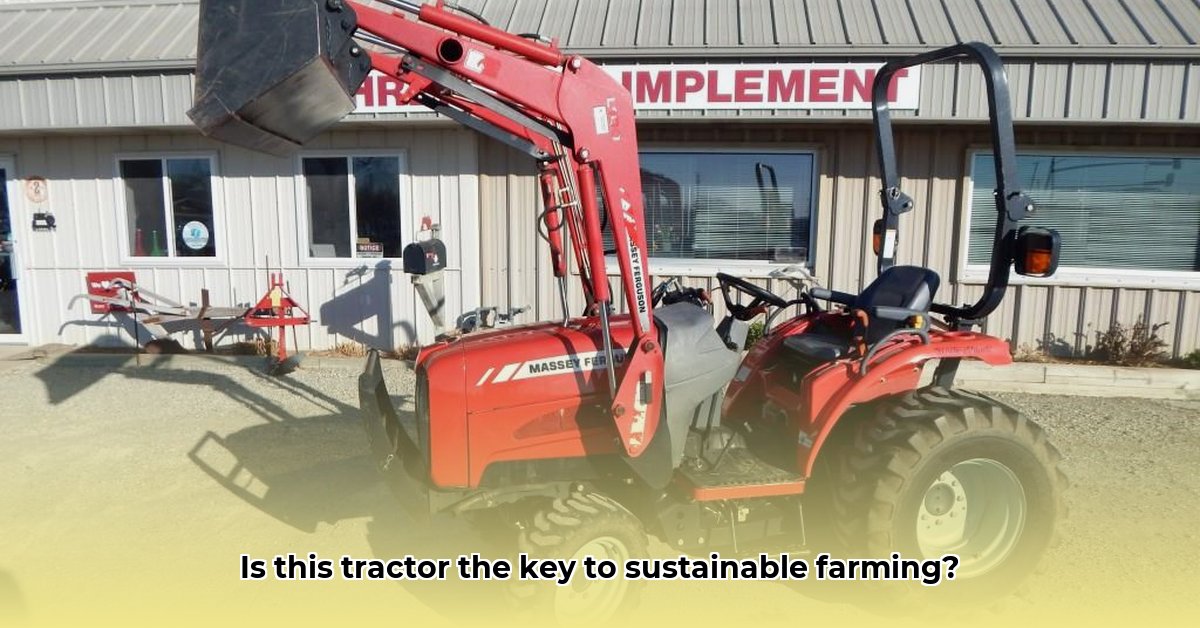
2007 Massey Ferguson 1528: A Sustainable Farming Choice?
The Massey Ferguson 1528, a compact tractor manufactured by Iseki, presents a compelling case study in the intersection of affordability and sustainable agricultural practices. This review analyzes its suitability for modern farming, weighing its advantages against the challenges posed by its age and technological limitations. We'll examine power, performance, sustainability, and cost-effectiveness, ultimately aiming to help you decide if it's the right fit for your operation. For more Massey Ferguson specs, see this helpful resource.
Power and Performance: Capabilities and Limitations
The MF 1528 boasts a 28.4 horsepower engine (a significant power output for a compact tractor), suitable for a range of small-scale tasks. Buyers could choose between a 9-speed geared transmission or a more convenient hydrostatic option. Its 2425 lb rear lift capacity allows for the use of various implements, from plows to harrows. Critically, its compact 65.6-inch wheelbase and 2423 lb weight minimize soil compaction – a key benefit for environmentally conscious farmers. However, its capabilities are limited compared to more modern, higher horsepower tractors. Can this compact power source truly meet the needs of your sustainable farm?
The Challenges of Older Technology
Purchasing a used 2007 MF 1528 presents inherent challenges. Sourcing parts may prove difficult, potentially increasing repair costs. Fuel efficiency is likely lower than newer models, a significant factor in today's cost-conscious agricultural landscape. Furthermore, its open-center hydraulic system is less energy-efficient than the closed-center systems in modern tractors. These factors significantly impact long-term cost-effectiveness and environmental sustainability.
Sustainability Assessment: A Critical Analysis
Sustainable agriculture demands efficient resource management. Unfortunately, comprehensive data on the MF 1528's long-term sustainability is scarce. To fully assess its environmental impact, we need detailed information on its long-term reliability, fuel consumption rates (liters per hectare), and overall lifespan. Without such critical data, a truly comprehensive evaluation remains impossible. How does the MF 1528's fuel consumption compare to modern alternatives? This is crucial information when considering sustainability.
Data Gaps and the Need for Further Research
A definitive assessment of the MF 1528's sustainability requires more than speculation. The lack of readily available comparative data against modern compact tractors is a significant limitation. To make an informed decision, detailed information on fuel efficiency (liters/hectare), greenhouse gas emissions (grams of CO2 per kilowatt-hour), component lifespan, and ease of repair and maintenance is essential. This comprehensive data is needed to accurately gauge its complete environmental footprint.
Stakeholder Perspectives and Considerations
Different stakeholders have varying priorities when evaluating this tractor:
| Stakeholder | Key Considerations | Actions for Sustainable Practices |
|---|---|---|
| Small-scale farmers | Initial cost, parts availability, operating expenses | Prioritize preventative maintenance, explore fuel efficiency improvements. |
| Equipment Dealers | Market demand, refurbishment feasibility, parts availability | Stock modern, fuel-efficient tractors; offer refurbishment services. |
| Manufacturers (AGCO) | Lifecycle analysis of the MF 1528; data transparency | Design more sustainable models with better data reporting. |
| Researchers | Comprehensive lifecycle assessment; comparative analysis | Develop best practices for sustainable farm machinery management. |
Performance and Reliability: A Detailed Look
The MF 1528, often paired with its Agco ST28A sibling, has a reputation for dependability, particularly in light-duty applications. Many users praise its sturdy build and straightforward maintenance requirements. However, reports of issues like leaking front axle seals and worn bushings highlight the importance of regular preventative maintenance. This is critical for extending the tractor's lifespan and avoiding costly unexpected repairs.
Fuel Efficiency: A Comparative Analysis
While adequate for its time, the MF 1528's fuel efficiency pales in comparison to modern, more fuel-efficient tractors. Technological advancements in engine design, transmission systems, and tire technology have significantly reduced fuel consumption in comparable compact utility tractors. Precise fuel consumption data for the MF 1528 is hard to find, hindering direct comparisons. However, anecdotal evidence suggests it's significantly less efficient than newer models.
Sustainability Beyond Fuel Efficiency
The conversation extends beyond simple fuel efficiency. Modern sustainable farming prioritizes a reduced environmental footprint. While the MF 1528 is not inherently unsustainable, its lower fuel efficiency contributes to a greater carbon footprint than newer tractors. Furthermore, the availability of replacement parts impacts long-term sustainability. The accessibility of parts varies geographically; a tractor requiring frequent, difficult-to-source repairs is less sustainable than one with readily available components.
A Comprehensive Cost-Benefit Analysis
The MF 1528 presented a competitive price point upon release. Used models remain relatively inexpensive. However, potential repair costs and increased fuel consumption must be carefully weighed against the initial purchase price of a modern fuel-efficient tractor. The initial savings of a used 1528 may be offset by higher long-term running costs.
Conclusion: Context is Key
The 2007 Massey Ferguson 1528 is a complex case. It offers reliability and simplicity for certain applications but its age and lower fuel efficiency pose challenges for sustainable farming. Its strengths lie in its affordability and ease of maintenance, but a thorough cost-benefit analysis, considering fuel efficiency and maintenance costs, is crucial before determining its suitability for your specific needs. Ultimately, the final verdict relies heavily on the individual context and operational demands.